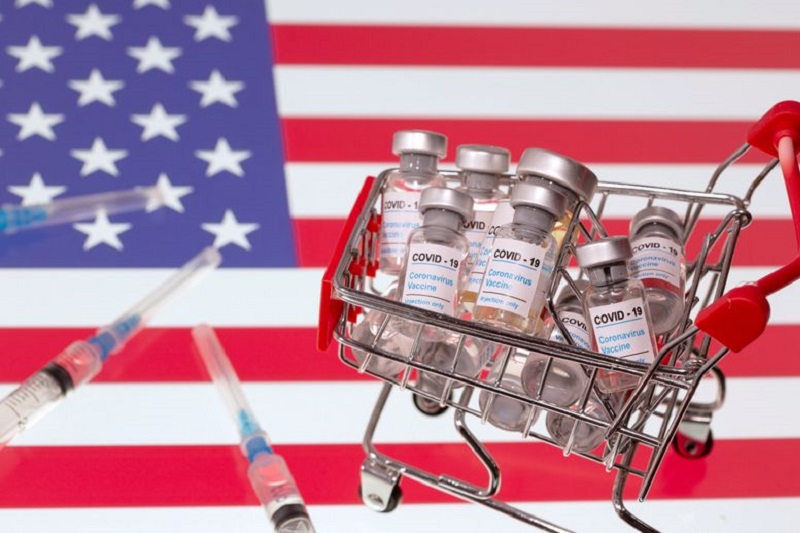By Mike Dolan
LONDON (Reuters) - A collision of vaccine races, early policy reversal and even currency wars could well give investors a headache this year.
Speed in ending the pandemic is clearly critical to all economies and markets. And strategists everywhere are poring over relative rates of vaccine rollouts for a lead on whose national herd reaches immunity first - with obvious implications for businesses, consumers and markets.
On available data, Israel seems far ahead with more than 30 doses per 100 people already. Britain and the United States lead the larger economies with between five and seven. Europe, China and the rest of the world lag despite plans to ratchet up distribution.
Some analysts even point to the outperformance of the shekel, sterling and even the U.S. dollar against the euro over the past couple of weeks as being partly related to the varying degrees of vaccine success to date.
But picking winners based on countries fastest to immunize populations may be a lot harder than it seems.
A series of reports from HSBC, Deutsche Bank (DE:DBKGn), Citi and others this week spotlighted the complexity of the vaccination process, uncertainties around takeup, parallel infection rates and hospitalizations, quick catch-ups in rollout and differing starting points economically and in terms of restrictions.
"The tension between the speed and effectiveness of the vaccine rollouts and the rising case numbers means there is unusual uncertainty," wrote HSBC's Global Chief Economist Janet Henry and team this week, adding that "until the pandemic is contained everywhere it is not completely contained anywhere."
Deutsche Bank strategist Robin Winkler said a slow start to the process meant the threshold of 'herd immunity', where 60-70% of populations would be vaccinated, had been pushed back to the late autumn now for the major economies.
But he added a more upbeat note that restrictions will start to lift quickly by the spring once 20-25% of the most vulnerable people are reached - with the UK in line to hit that by March, the United States by April and Europe, Canada and Australia by May. "We doubt that herd immunity is a necessary condition for economies to rebound strongly over the summer," he said.
BEWARE SEQUENCING
Yet the read-across to markets is less clean.
Returning business and consumption back to normal clearly hinges on lifting lockdowns quickly. But that may also allow governments to roll back extensive supports earlier too - possibly complicating the picture for stock and bond markets, which have already largely priced recovery on the back of a flood of public rescue money used to bridge gaps in activity.
And currency markets riff off a different script.
The first countries to rebound may be first to reignite inflation. Under most prevailing narratives, relatively higher inflation and inflation expectations should weaken currencies if central banks don't plan to compensate holders with higher interest rates - something few expect for up to two years in the major economies as central banks seek to embed recoveries while keeping accumulated debt piles affordable.
One of the main reasons for the overwhelmingly negative consensus on the dollar right now is an expectation that the Federal Reserve will be more successful in generating higher inflation than in the euro zone or Japan and is now committed to tolerating above-target price rises for longer.
If the Fed effectively caps interest rates and bond yields for two years while doing so, the stress on the dollar will be felt by even more negative real or inflation-adjusted bond yields.
While relative U.S.-European 10-year real rates moved back up in favour of the dollar over the past couple of weeks, steadying the greenback in the process, a quicker U.S. economic re-opening on the back of an early vaccination success and more direct fiscal stimulus would likely have the opposite effect.
On the flipside, most policymakers will not welcome sharp currency gains squashing exports into a global rebound - only to become 'losers' in the so-called currency war at a sensitive time for hobbled businesses.
To the extent the shekel's recent rebound was at least partly down to vaccine optimism, it has been quickly whacked back down by heavy Bank of Israel intervention last week.
And in Europe, successive bouts of euro/dollar strength over the past six months have been met with a barrage of verbal protests by the European Central Bank.

The message may simply be to be wary of sequencing any market bets solely on national vaccination races or supposed currency gains and keep focused on how markets trade the normalisation of the world economy at large.
(by Mike Dolan, Twitter: @reutersMikeD. Charts courtesy of World in Data, HSBC and Deutsche Bank; Editing by Susan Fenton)
